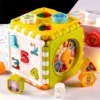Breastfeeding is often portrayed as a serene bonding moment between mother and baby. However, if your baby cries during breastfeeding, it can be disheartening and leave you wondering what might be causing their distress. Understanding the reasons behind your baby’s tears can help you confidently navigate these moments and provide comfort and support.
There are several common reasons why babies cry during breastfeeding. It could be due to hunger cues that weren’t recognized early enough, leading to frustration. Issues with latching, such as improper positioning or difficulty achieving a good latch, may also cause discomfort for your baby. Environmental factors, like distractions or discomfort from noise or temperature, can also play a role.
In this blog, we’ll explore these potential reasons in detail and provide practical tips to help soothe your crying baby during breastfeeding. By addressing these factors, you can enhance the breastfeeding experience for you and your baby, fostering a deeper bond and ensuring optimal comfort and nourishment.
Why Is My Baby Crying While Breastfeeding?
Breastfeeding is a beautiful and natural process, but it can sometimes be challenging when your baby cries during feeding sessions. It’s essential to understand that crying is your baby’s primary way of communicating their needs and discomforts. By recognizing the various reasons behind their tears, you can address these issues more effectively and make breastfeeding a more enjoyable experience for both you and your baby.
1. Hunger and Feeding Cues
Babies communicate their needs through crying, and hunger is one of the primary reasons. Recognizing early hunger cues, such as rooting, sucking on hands, or smacking lips, can help you start feeding before your baby becomes too upset. If a baby is overly hungry, it might cry and struggle to latch on properly, leading to frustration for both the baby and the mother.
2. Latching Issues
Proper latching is crucial for effective breastfeeding. If the baby is not latched on correctly, they may not get enough milk, leading to crying. Common latching problems include a shallow latch, incorrect positioning, or tongue-tie. Ensuring a deep latch and comfortable positioning can help alleviate these issues. Consulting a lactation expert can also provide guidance and support.
3. Overactive Letdown
An overactive letdown occurs when milk flows too quickly from the breast. This can overwhelm the baby, causing them to choke, cough, or pull away from the breast in distress. To manage an overactive letdown, try nursing in a laid-back position, where gravity can slow the milk flow. Expressing some milk before feeding can also help regulate the flow.
4. Slow Letdown
Conversely, a slow letdown can frustrate a baby who has to work harder to get milk. If your baby is crying and pulling at the breast, it might be because the milk is not coming fast enough. Techniques such as breast massage, warm compresses, and relaxation can help stimulate a faster letdown.
5. Discomfort or Pain
Babies may cry during breastfeeding if they are experiencing discomfort or pain. This can be due to various reasons, such as teething, ear infections, or gas. Observing other signs and symptoms can help identify if discomfort is the cause. Consulting with a pediatrician can provide solutions to alleviate the baby’s pain.
6. Fatigue
Sometimes, babies cry during breastfeeding because they are simply tired. If a baby is overly tired, they may find it hard to focus on feeding and become fussy. Establishing a consistent feeding and sleeping schedule can help prevent overtiredness.
7. Attention and Bonding
Babies might also cry during breastfeeding to seek comfort and attention. The breastfeeding process is not just about feeding but also about bonding. Ensuring a calm and comfortable environment can enhance the bonding experience, reducing the chances of crying due to emotional needs.
By understanding and addressing these common reasons for crying while breastfeeding, parents can create a more pleasant and successful breastfeeding experience for both themselves and their baby.
Discomfort And Pain
Breastfeeding is a beautiful bonding experience between mother and baby, but it can also come with challenges, especially when your little one seems uncomfortable or in pain. Understanding the potential causes of discomfort can help you address them effectively, ensuring a smoother feeding experience for you and your baby.
Gas or Colic: Gas or colic can cause significant discomfort, leading to crying during or after feeding. Signs of gas include pulling legs towards the belly, arching the back, and excessive burping or passing gas. To alleviate gas, try burping your baby frequently during and after feeds, and consider using gentle tummy massages or leg bicycling exercises.
Teething: Teething can be a painful process for babies and can cause them to cry during breastfeeding. The pressure of sucking can exacerbate the pain in their gums. Providing a cold teething ring or a clean, cold washcloth to chew on before feeding can help soothe their gums and make feeding more comfortable.
Illness or Infection: If your baby is ill or has an infection, such as an ear infection or thrush, they may cry during breastfeeding due to pain or discomfort. Look for additional signs of illness, such as fever, irritability, or changes in feeding patterns, and consult your pediatrician if you suspect an underlying health issue.
Reflux: Gastroesophageal reflux (GER) occurs when stomach contents flow back into the esophagus, causing discomfort and crying during or after feeding. Reflux signs include spitting up frequently, irritability when lying down, and arching the back. Keeping your baby upright during and after feeds, feeding smaller amounts more frequently, and consulting your pediatrician can help manage reflux symptoms.
Understanding and addressing these common causes of discomfort can help soothe your baby and make feeding times more enjoyable for both of you. If the crying persists, it’s always best to consult a healthcare professional for further guidance.
Emotional Factors
Breastfeeding isn’t just about nourishment; it’s a deeply emotional experience that connects mother and baby on multiple levels. However, emotional factors can sometimes influence how smoothly breastfeeding sessions go.
One significant emotional factor is stress. When mothers are stressed, their milk flow can be affected, making it harder for babies to feed comfortably. Finding ways to relax before and during feeding sessions, such as deep breathing exercises or listening to calming music, can help create a more conducive environment for breastfeeding.
Another emotional aspect is anxiety or worry. Mothers may feel anxious about their milk supply, baby’s latch, or whether their baby is getting enough milk. This anxiety can interfere with the let-down reflex and overall breastfeeding experience. Seeking support from a lactation consultant or joining breastfeeding support groups can provide reassurance and practical tips to address these concerns.
Feelings of guilt or pressure can also impact breastfeeding. Some mothers may feel guilty if breastfeeding doesn’t go as smoothly as expected or if they encounter difficulties. It’s important to remember that every breastfeeding journey is unique, and seeking support from healthcare professionals or peer support groups can offer encouragement and guidance.
Past experiences or trauma can influence how a mother feels about breastfeeding. Addressing these emotions with a therapist or counselor trained in perinatal mental health can be beneficial in navigating and processing these feelings.
Environmental Factors
Breastfeeding is not just a physical act but can also be influenced by the environment in which it occurs. Several environmental factors can affect both the mother’s comfort and the baby’s ease of breastfeeding. Here are points to be noted
- Distractions: A busy or distracting environment can make it difficult for a baby to focus on breastfeeding, leading to fussiness and crying. Avoid distractions by feeding in a quiet, comfortable space with minimal interruptions. Dimming the lights and using white noise can also help create a soothing atmosphere.
- Positioning: Incorrect positioning can cause discomfort for the mother and the baby, leading to crying during feeding. Experiment with different breastfeeding positions, such as the cradle hold, football hold, or side-lying position, to find the most comfortable one for you and your baby. Using pillows for support can also help achieve a better position.
- Room Temperature: Extreme temperatures can affect a baby’s comfort during breastfeeding. If the room is too hot or too cold, your baby may become fussy. Ensure the room is comfortable, and dress your baby appropriately for the conditions.
Tips For Soothing A Crying Baby
Here are some effective and practical tips to help you soothe a crying baby during breastfeeding, ensuring a more comfortable and enjoyable feeding experience for both you and your little one.
1. Check for Hunger Cues Early: Recognize your baby’s early hunger cues, such as sucking on fists or rooting movements. Starting the feeding session before your baby becomes overly hungry can help prevent frustration and make breastfeeding more comfortable.
2. Ensure Proper Latch: A good latch is crucial for successful breastfeeding. Make sure your baby’s mouth covers both your nipple and a large portion of the areola. This ensures effective milk transfer and prevents nipple pain. If you’re unsure about the latch or experiencing difficulties, consider seeking guidance from a lactation consultant for personalized support.
3. Create a Calm Feeding Environment: Minimize distractions and create a peaceful atmosphere for breastfeeding. Choose a quiet, comfortable space where you and your baby can relax. Soft lighting or white noise can help soothe your baby and enhance the bonding experience during feeding.
4. Burp Your Baby: Gas can contribute to discomfort and crying during or after feeds. Burping your baby frequently helps release trapped air and reduces the likelihood of gas pains. Experiment with different burping positions, such as over your shoulder or sitting upright on your lap, to find what works best for your baby.
5. Comfort Measures: Try additional comfort techniques if your baby continues to cry despite addressing hunger and gas. Gentle rocking, holding your baby skin-to-skin, or offering a pacifier can provide soothing sensations and help calm your baby. These measures comfort your baby and create a positive association with breastfeeding.
Implementing these tips can create a nurturing and supportive environment for breastfeeding, promoting a more enjoyable experience for you and your baby. Remember, every baby is unique, so be patient and responsive to your baby’s cues to find what works best for them.
Conclusion
Breastfeeding can be challenging, especially when your baby cries during feeds. Understanding their distress and implementing practical solutions can make a significant difference.
Facing challenges is normal, and seeking support when needed is essential. Addressing common issues, creating a calm feeding environment, and providing comfort measures can make breastfeeding a more peaceful and enjoyable experience for you and your baby.
If you have any concerns or need additional help, don’t hesitate to contact a lactation consultant or your pediatrician. Share your experiences and questions in the comments section
below—your insights can help other parents facing similar challenges.
FAQs
Why does my baby suddenly cry while nursing?
Babies may cry during nursing due to hunger, discomfort, gas, or distractions. They might also cry if they are tired or overstimulated.
How do I stop my baby from crying while feeding?
To soothe a crying baby during feeding, ensure a proper latch, check for hunger cues early, create a calm environment, burp your baby frequently, and try gentle rocking or skin-to-skin contact.
Why is my baby crying during feeding?
There could be several reasons why your baby cries during feeding, including hunger, discomfort (like gas or teething), an improper latch, or environmental factors such as noise or bright lights.









